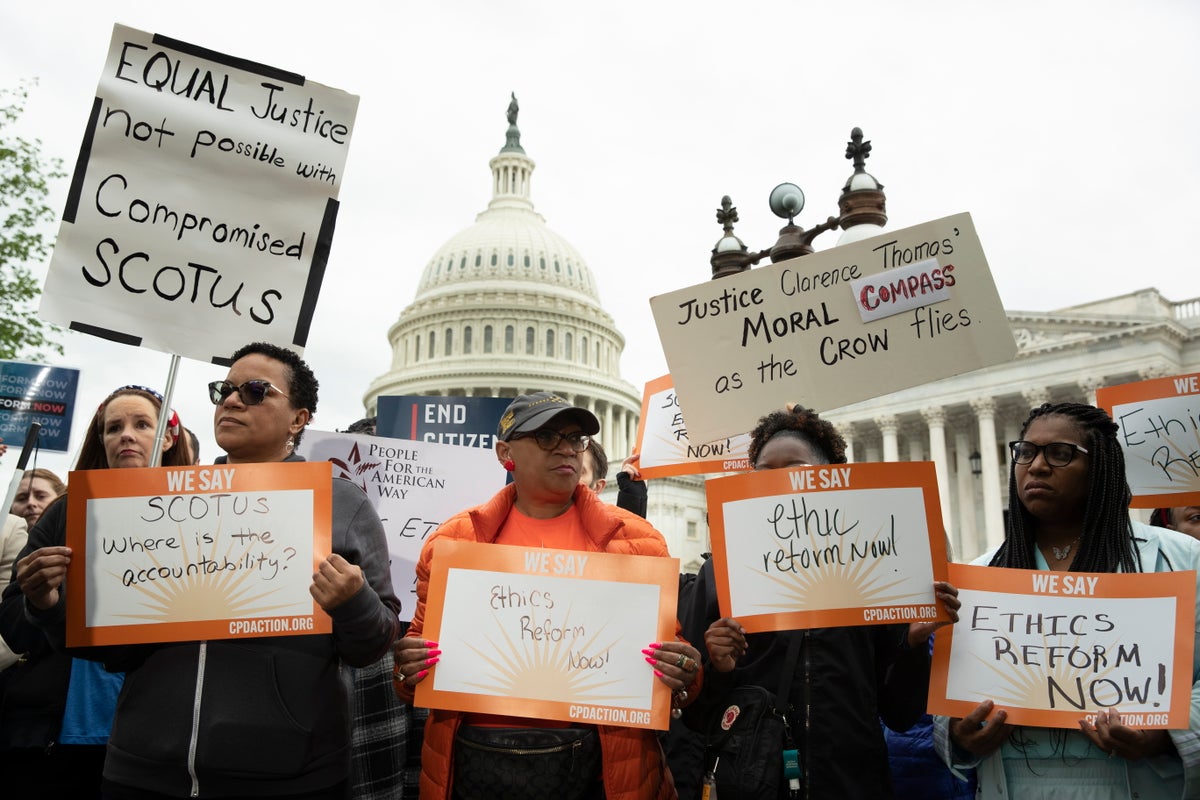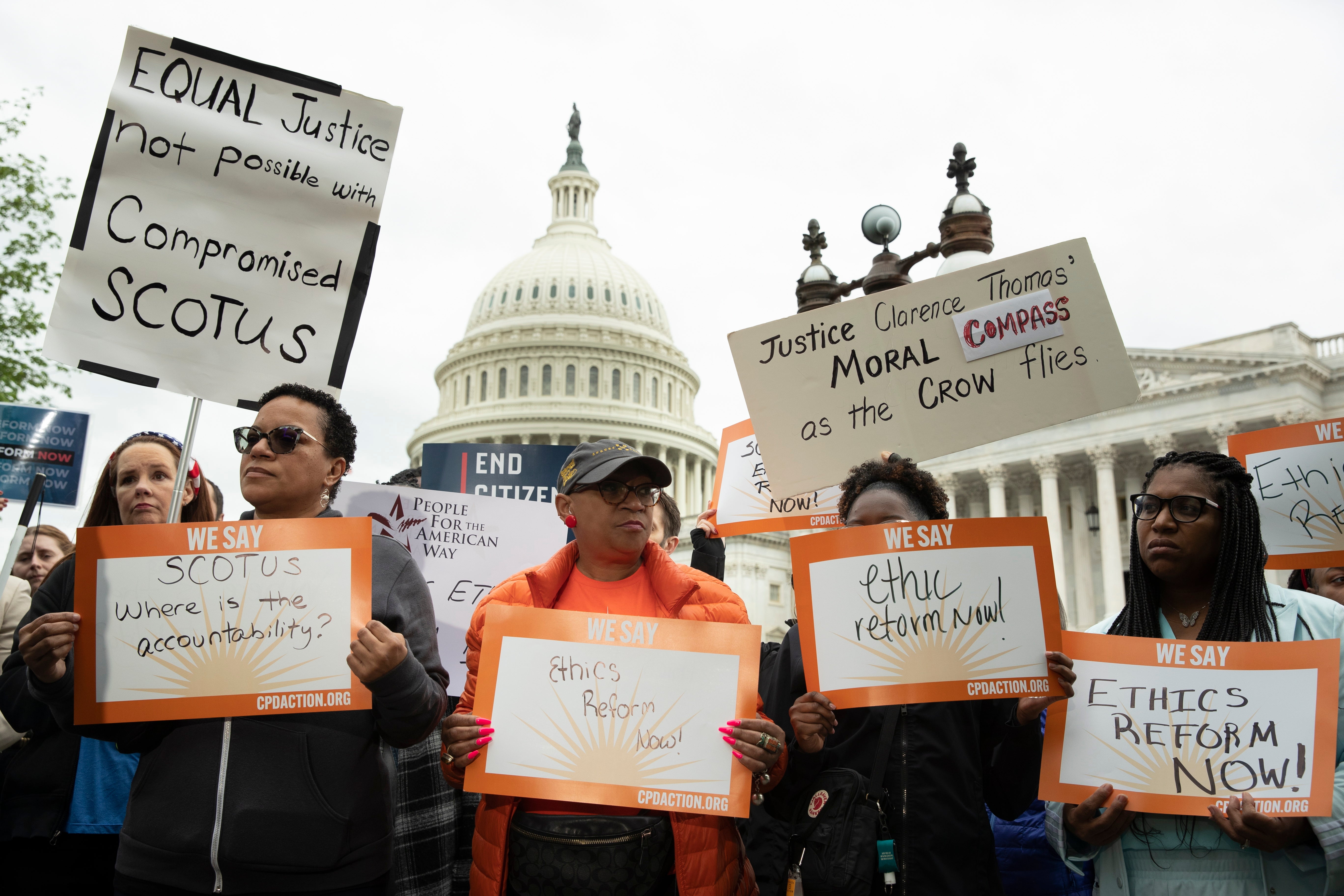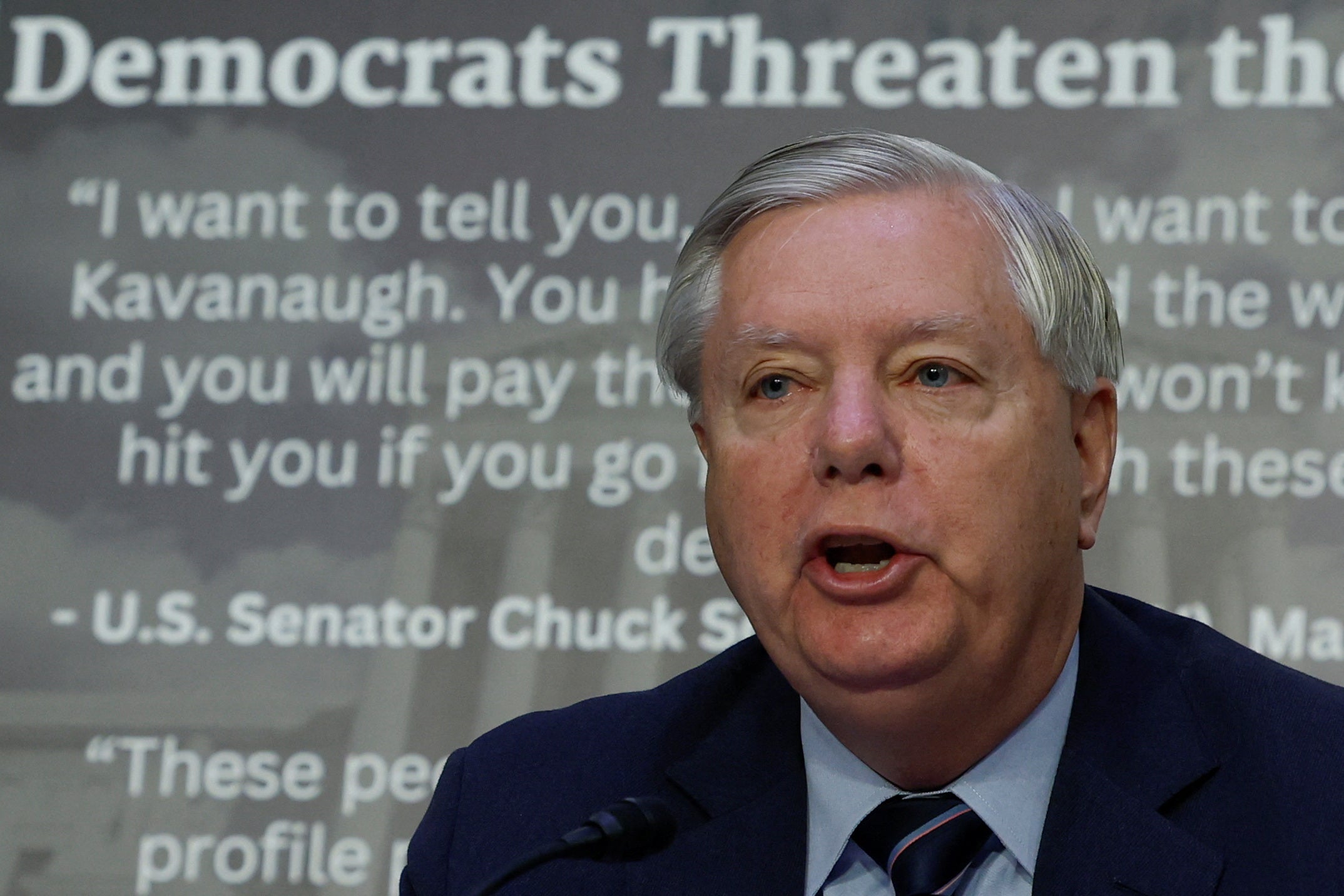
Unreported gifts and lavish vacations worth tens of thousands of dollars from politically connected megadonors. Undisclosed real-estate transactions involving family members. Potential conflicts of interest with enormous political impacts.
Following an avalanche of reporting about justices on the nation’s highest court, Democratic members of Congress have argued that the US Supreme Court – the only arm of the federal judiciary that is not bound by a code of ethics – should not be insulated against a system of checks and balances.
Notably absent from a Senate Judiciary Committee hearing on Supreme Court ethics on 2 May was any member of the court. Chief Justice John Roberts was invited, but he declined to appear.
Committee chair Dick Durbin said recent reporting that exposed the close relationships between Justice Clarence Thomas and his friend and influential Republican donor Harlan Crow, among other revelations involving members of the court, would be unacceptable at any other level of government.
But the court “won’t even acknowledge that it’s a problem,” the Democratic senator said.
“How low can the court go?” he added. “Because the court will not act, Congress must.”
A ProPublica investigation into Justice Thomas was the latest in a string of findings over the last two decades about questionable gifts and the relationships between conservative members of the nine-member panel with special interest groups and other figures that have business at the court.
“The court should have a code of conduct with clear and enforceable rules so both justices and the American people know when conduct crosses the line,” Mr Durbin said at Tuesday’s hearing.
“The highest court in the land should not have the lowest ethical standards,” he said. “That reality is driving a crisis in public confidence in the Supreme Court. The status quo must change.”
Several proposals in Congress – including legislation introduced by Independent Senator Angus King and Republican Senator Lisa Murkowski – would force the nation’s high court to create a binding code of conduct, appoint an ethics officer to oversee compliance, or establish an ethics policy as strict as one for members of Congress.
Republican lawmakers – who have supported a years-long effort with right-wing legal groups to radically reshape the federal judiciary by seating dozens of ideologically like-minded judges – accused congressional Democrats of using “ethics reform” to undermine the Supreme Court’s conservative supermajority, a long-held goal of GOP-aligned special interest groups.
Republican Senator Ted Cruz of Texas at one point during Tuesday’s hearing accused Democratic lawmakers of racism by singling out Justice Thomas. As an example, he showed a copy of a magazine illustration depicting the justice shining the shoes of the late Justice Anton Scalia. The magazine went out of business more than 20 years ago. The cover was from 1996.
“The left despises Clarence Thomas. And they do not despise him because he’s a conservative, the left despises Clarence Thomas because he is a conservative African American,” Mr Cruz said.
Republican Senator Lindsey Graham characterised the hearing and other Democratic-led efforts for ethics reform at the Supreme Court as a “concentrated effort by the left to delegitimise this court and to cherry-pick examples to make a point.”
“This assault on Justice Thomas is well beyond ethics,” he added. “It is about trying to delegitimise a conservative court that was appointed through the traditional process.”

Congressional Republicans have accused Democrats over the years of a kind of judicial extremism in advocating for expanding the number of seats on the Supreme Court or adding more oversight, despite the GOP’s own efforts to pack federal courts across the country with judges vetted by right-wing legal groups and conservative activists.
Senator Chuck Grassley accused Democratic lawmakers and the press of working in concert to do “the bidding of liberal grand plans” to undermine the Supreme Court. He pointed to “relentless political battering” and “left-wing dark money interest groups” who are “engaged in a crusade to threaten, pack and smear the courts.”
“All because the left is opposed to recent court rulings,” he said.
The Supreme Court’s 2010 decision in the Citizens United case has allowed groups that do not disclose their donors to spend unlimited sums on campaigns, including tens of millions of dollars to influence judicial nominations.
Within the years that followed, groups aligned with Republican candidates and right-wing causes spent tens of millions of dollars supporting their favoured campaigns to immense success, but rather than reverse Citizens United, Republicans have instead zeroed in on “dark money” groups backing Democratic causes.
Former US Attorney General Michael Mukasey, who was in office during George W Bush’s administration, defended the Supreme Court justices under scrutiny and said the American public is being forced to “hallucinate misconduct” at the court in a concerted effort to undermine its authority.
He also said that if any law imposing ethics requirements at the court were ever challenged in a lawsuit, “I believe it would be found to be unconstitutional” – suggesting that he believes Supreme Court justices who would be forced to abide by those checks and balances would toss it out anyway.

Democratic Senator Jon Ossoff pressed Mr Mukasey whether he, as a judge, would have declined the kinds of offers that Justice Thomas accepted from Mr Crow.
“If I were a district judge and somebody wanted to fly me on his private plane on a vacation with his family, and I were friendly with that person, would I have refused and endangered the friendship? I’m not sure that I would’ve,” he said.
After a beat, Mr Ossoff replied: “I think the American public sees that kind of conduct and quite reasonably asks the question whether it’s appropriate.”
Before the hearing, a pair of influential constitutional experts told the committee that Congress does have the power to impose a code of conduct on the Supreme Court.
A statement from retired appeals court Judge J Michael Luttig – a prominent conservative former federal judge revered on the right – said that Congress “indisputably has the power under the Constitution” to “enact laws prescribing the ethical standards applicable to the nonjudicial conduct and activities of the Supreme Court of the United States.”
He said a binding code of conduct “ought not be thought of as anything more – and certainly nothing less – than the housekeeping that is necessary to maintain a Republic.”
In another statement, former Harvard Law School professor Laurence Tribe said congressional attempts “to impose ethical norms in a binding way on the justices” are “eminently sensible.”
“I see such legislation as a necessary though probably not sufficient response to the current situation,” he wrote.

Legal experts and Democratic lawmakers rejected Republican arguments that imposing a code of ethics on the Supreme Court would violate the separation of powers between the court and Congress.
“Checks and balances is equally important, and the role of the Congress is to establish the Supreme Court. It’s not just permitted, it’s required,” Amanda Frost, a law professor at the University of Virginia School of Law, told the committee.
The Supreme Court’s creation is constitutionally mandated, but there is “no detail about how to operate – that is left to the Congress,” she said.
Deciding whether it abides by congressional oversight is “not in the hands of the chief justice and his colleagues,” she added.
“The justices are not free to say that law does not apply to me,” she said. “What is troubling is, there is an implication in the recent statement of ethics policies as well as previous statements by the court, that it doesn’t think these laws bind it.”
Kedrick Payne, a senior director of ethics at the Campaign Legal Center, said it is “unclear” why the Supreme Court simply has not created its own code of conduct.
“They could create this immediately,” he said.







